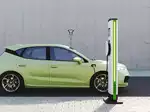Hyundai, Kia recall over 2 lakh EVs in US over 'drive power' issue

Automakers Hyundai and Kia are recalling nearly 208,000 electric vehicles (EVs) in the US owing to an issue that could cause the vehicles to suddenly lose power.
As per filings with the US National Highway Traffic Safety Administration (NHTSA), the issue is with the Integrated Charging Control Unit (ICCU) that "may become damaged and stop charging the 12-volt battery, which can result in a loss of drive power."
"Dealers will inspect and replace the ICCU and its fuse, as necessary. In addition, dealers will update the ICCU software. All repairs will be performed free of charge," said the recall notification on NHTSA website.
Hyundai is recalling over 145,000 Ioniq and Genesis vehicles, which includes some Ioniq 5 and Ioniq 6 vehicles. The recall also covers three electrified variants from its luxury brand Genesis, including the Genesis GV60, Genesis GV70, and Genesis G80 from model years 2022-2025.
Nearly 62,872 Kia EV6 vehicles have also been recalled. Dealers will fix the issue for free.
After the failure of the ICCU, a series of driver warnings appear, and the vehicle activates a "fail-safe" driving mode that slowly reduces drive power over the course of 20 to 40 minutes.
"A loss of drive power increases the risk of a crash," according to the recall notification.
In 2021, over 80,000 Kona EVs were recalled due to a fire risk caused by an LG battery defect after reports of a dozen battery fires.
Earlier this year, Elon Musk-run Tesla recalled more than two million vehicles -- almost all of the cars it sold in the US -- due to incorrect font size on warning lights. The recall of almost 2.2 million vehicles included nearly all Tesla EV models, including Model S, Model X, 2017-2023 Model 3, Model Y, and 2024 Cybertruck vehicles.
The NHTSA also noted that warning lights with a smaller font size can make critical safety information on the instrument panel difficult to read, increasing the risk of a crash.
--IANS
na/

